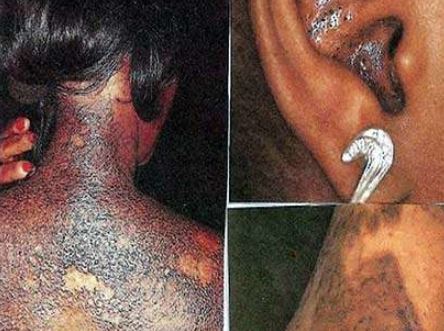
Bleaching gone wrong
The
World Health Organisation has said that 77 percent of women in Nigeria
use skin-lightening products, the highest percentage in the world.
Public Health Practitioner at the Department of Biochemistry and
Nutrition, Nigerian Institute of Medical Research, NIMR, Dr. Chidinma
Gab-Okafor has warned Nigerians that exposure to cosmetic products for
the purpose of skin lightening may result in different types of
non-communicable diseases.
Speaking during the public lecture titled; An overview of the impact of chemical exposures from cosmetics and personal care products, organized by NIMR, Gab-Okafor said that skin bleaching which refers to the practice of using creams, soaps, serum, lotions, relaxers, scrubs, oils, face wipes, foundations, powders and other cosmetic products works by reducing the black pigment called melanin that protects skin from effects of sunlight.
The World Health Organisation has said that 77 percent of women in Nigeria use skin-lightening products, the highest percentage in the world. This means eight out of every 10 per cents each their skin. Studies also shown that more than 50 per cent of men in Nigeria also uses skin bleaching products and the most dangerous aspect is that children have also been involved by their parents.
She disclosure at the skin bleaching products contain three main chemicals called hydroquinone, mercury and corticosteroids, most creams and soap sold in the market are a dangerous mixture of these chemicals like steroids, mercury and hydroquinone. These chemicals can cause cancer and using them for a long period of time can lead to very serious health issues like skin cancer, blood cancer, liver and kidney cancer, liver damage and kidney failure.
Apart from cancer, research has also shown that skin bleaching products can also cause hypertension, diabetes, reduce immunity, inability to have children and can affect unborn children when used in pregnancy.
On his part, Director-General of NIMR, Professor Babatunde Salako said that the institute will continue to sensitize the public on things that can be dangerous to their health.
Speaking during the public lecture titled; An overview of the impact of chemical exposures from cosmetics and personal care products, organized by NIMR, Gab-Okafor said that skin bleaching which refers to the practice of using creams, soaps, serum, lotions, relaxers, scrubs, oils, face wipes, foundations, powders and other cosmetic products works by reducing the black pigment called melanin that protects skin from effects of sunlight.
The World Health Organisation has said that 77 percent of women in Nigeria use skin-lightening products, the highest percentage in the world. This means eight out of every 10 per cents each their skin. Studies also shown that more than 50 per cent of men in Nigeria also uses skin bleaching products and the most dangerous aspect is that children have also been involved by their parents.
She disclosure at the skin bleaching products contain three main chemicals called hydroquinone, mercury and corticosteroids, most creams and soap sold in the market are a dangerous mixture of these chemicals like steroids, mercury and hydroquinone. These chemicals can cause cancer and using them for a long period of time can lead to very serious health issues like skin cancer, blood cancer, liver and kidney cancer, liver damage and kidney failure.
Apart from cancer, research has also shown that skin bleaching products can also cause hypertension, diabetes, reduce immunity, inability to have children and can affect unborn children when used in pregnancy.
On his part, Director-General of NIMR, Professor Babatunde Salako said that the institute will continue to sensitize the public on things that can be dangerous to their health.


No comments:
Post a Comment